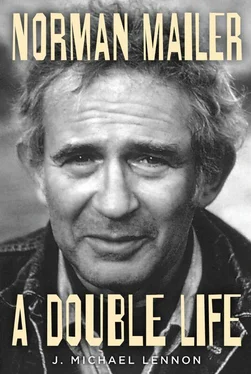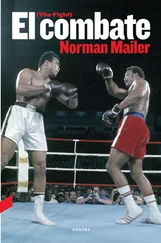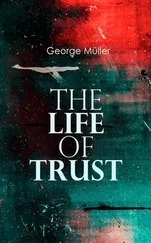In addition to his parents’ precarious financial situation and the possibility of a divorce, he was buffeted by a cross-hatch of other pressures. On the one hand, there was his mother’s unshakable belief in his talents, buttressed by the approval of his tight-knit extended family, with Anne and Dave Kessler acting as a second set of parents. He was also enthralled by the gangster films of the 1930s (especially the brash energies of James Cagney) and the romantic novels of Rafael Sabatini and Jeffery Farnol, which he had begun to devour. On the other side of the ledger were his fear of the Irish toughs a few blocks outside the Jewish cocoon and a sharp sense of his puny physicality (“We also had a sense,” he remarked decades later, “of not being as tough as the Irish”). Vying for primacy with Fan in defining his emerging ego was his father’s “prodigious double life,” as he later described it, a life he pondered with awe. Nine months before he died, he told a friend about Barney’s influence: “Everything that is adventurous in me came from him.” These opposed pressures opened a fissure in the adolescent Mailer’s personality that widened as time passed until it became a gaping divide.
“Very intense” is how his sister remembers him as a boy; their older cousin Osie, she said, called him “Desperate Ambrose,” after the comic strip character. His friend Robert F. Lucid compared the young Mailer to Alexander Portnoy, “the most fabulous kid who ever lived,” but one who had been given a “tremendous sense of mission.” Mailer put it this way: “I’d been frightened in the womb by my mother’s dream of having a little Einstein in her belly.” His sister recalls that his family regularly referred to him as a genius from the time he took the Stanford-Binet IQ exam in third grade. He excelled in all his classes and even skipped the latter halves of grades seven and eight. Fan’s hopes were confirmed when, according to Barbara’s friend Rhoda Lazare, the principal announced at his eighth grade graduation that Norman Mailer had an IQ of 170, the highest ever recorded at P.S. 161.
If on the lip of puberty his inner life was a narcissistic moil, his pursuits were ordinary. After school, he spent most of his time studying, attending Hebrew School (through eighth grade), reading, playing stickball and Monopoly, building model airplanes and experimenting with his chemistry set. He also went to see gangster movies at Loew’s Kameo and the Savoy on Eastern Parkway, often bringing his sister along. He often said that he felt he knew Humphrey Bogart as well as a favorite uncle. Summers were spent in Long Branch, where he observed the feats of his cousin Cy, eight years his senior.
I worshipped him (with enormous funds of love and envy) because he was a hero. He was one of the few people I’ve ever known who had a happy look on his face when he came to bat in the late innings with men on base, his side behind, and the need for a homer prominent in everyone’s head. Indeed he had his smile because it was slightly better than even money he was going to hit that homer. In fact, he would. This is not hyperbole. If I saw him in a hundred baseball games, there must have been fifty late-inning spots of exactly the sort I describe: he probably hit thirty-six homers out of fifty…. These were Depression years. Much gloom abounded in everyone, but he was the bright spot.
Cy Rembar remained Mailer’s hero (later becoming his lawyer) and one of his most important role models. His cousin’s string of victories on the playing fields contrasted glaringly with his father’s run of defeats at the poker table.
In a memoir written just before he died, Barbara described her brother as generous, encouraging, and always interesting. “He loved to teach,” she said, and often recommended books to her. She remembers that in high school he got a book that diagrammed the fox trot and they practiced together. “I learned to dance,” she said. “I’m afraid he did not.” Mailer recalled going with his father, who cared little for baseball, to see the Dodgers play. Mailer was not a recluse, but as a friend recalled, he did not hang around much at the candy store on the corner of Crown Street and Kingston Avenue with the other boys. By the time of his bar mitzvah in February 1936 at the Temple Shaari Zedek in Brooklyn, Fan had long since transferred her hopes from Barney to her brilliant son. She guarded him like a mother hawk.
Coached by his Hebrew teacher, who had leftist sympathies, Mailer wrote, memorized, and delivered a five-hundred-word bar mitzvah speech that was, with two exceptions, conventional. He began by thanking his family, citing the commandments, and stating his joy at becoming “a member of the people of Israel.” He lauded some great Jews — Moses Maimonides, Albert Einstein, Baruch Spinoza, and Karl Marx. Naming these last two — a freethinking excommunicant and an atheist radical — raised a few eyebrows and “the rabbi looked very pale” after his speech, Mailer remembered. In the second notable remark in his speech, he said, “Yes, my friends! From now on I become a Jew, but not a MAYOFIS JEW, with a bent back to receive innocently the inhuman Nazis. I become a Jew to uphold the ideals and strengths of Judaism, and the rights of my country.” In an interview he gave in connection with his final novel, about Hitler’s youth, The Castle in the Forest , Mailer remembered his mother’s warnings about the Nazis from three quarters of a century earlier.
Hitler has been in my mind since I was nine years old. By 1932, my mother was already sensitive, and intensely so, to the dangers he presented. After Hitler came to power in 1933, everything that happened in Nazi Germany used to cause my mother pain. It was as if she knew in advance what was going to occur. She’d grown up with the knowledge of the anti-Semitism her father had had to face in Lithuania. Then, as a child going to school in Long Branch, New Jersey, kids on the street would call her “Christ killer”—no surprise, then, if Hitler was immensely real to her.
His bar mitzvah speech, including the reference to the Nazis, pleased the family, most of whom had come up from Long Branch despite a storm that left more than a foot of snow. Millionaire Uncle Louis in South Africa sent a $500 gift, which enabled Fan to put out a fine buffet at 555 Crown Street after the ceremony. But Barney’s secret life again intruded. His bookie sent the gift of a watch. Fan didn’t hesitate to reply: “I phoned his home, his wife answered. I did not spare either of them, I cursed him out of existence. She begged me not to say those things, that her husband had a weak heart, so I followed it up by saying he could drop dead that minute and I hung up.” Fan took no prisoners.
LESS IS KNOWN of Mailer’s high school years than any other period of his life. He had stopped writing stories the year before he entered and wrote few letters before going away to college. We do know that like most of the Crown Heights boys, he took the Tompkins Avenue trolley to Boys High in the Bedford-Stuyvesant section of Brooklyn, or walked to save a nickel. We also know that because he had skipped a primary school grade, he was one of the youngest boys in his class, entering his freshman year at age 12. He later recalled, “I felt straddled between my friends who were my age at home and were two years behind me at school. So I didn’t feel I belonged particularly in one life or another.” His interest in his chemistry set and sports waned, but his passion for model airplanes, some with tiny gasoline engines, burgeoned during his high school years, 1935–39. He was a devoted member of the aviation club in high school and his first piece in print, “Model Airplanes,” appeared in a mimeographed school publication, Physical Scientist , in December 1938, when he was a senior. Occasionally, on weekends, his parents would drive him out to the open fields in Canarsie where he could launch his fragile creations. The largest of these, which took him six months to build, had an amazing six-foot wingspan. “When launched,” he recalled, “it soared briefly, but then its wings suddenly folded up — like an umbrella.”
Читать дальше












